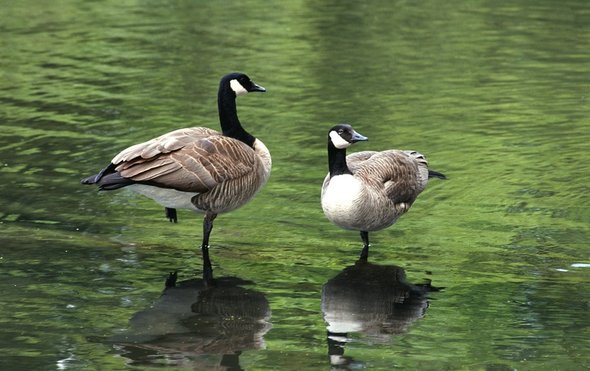(单词翻译:单击)
听力文本
This is Scientific American — 60-Second Science. I'm Emily Schwing.
"Over the last few decades, Canada geese have been wintering further and further north, which was interesting, because the winters have gotten a little more mild over the last few years, but still it's pretty cold out there and there's still snow."
University of Illinois ornithologist Mike Ward.
"So you even would wonder why these geese are deciding to spend the winter in Chicago, when they could have the opportunity to fly down to Arkansas, Louisiana, somewhere warmer."
Geese who continue south often land in agriculture fields and other wide open areas. Which makes them visible to hunters in those states, who can bag the birds until the end of January.
"There's definitely a lot of geese not just staying there winters in Chicago, but lots of urban areas throughout the Midwest and one reason they are doing that is they are trying to avoid hunters, it looks like."
Of course, staying in cities is no easy life either.
"It probably would be easier to find food if they would fly somewhere else, to go to cornfields or somewhere else, but they are hanging out in the city and they are acting very strangely."

"We found that they were using parks like you might expect, but when the weather got bad and it snowed, they were hanging out on top of roofs, so large factories with flat roof tops, they'd spend large amounts of time just sitting there. We also found that they would go to areas like transfer stations or rail cars that had spilled grains, so they would be walking around railroad tracks to find spilled grain."
And the effects of that changed behavior are significant.
"They are a lot skinner. That the ones that go onto ag fields, all the spilled corn and soybeans— they can really fatten up really well. And then the birds that we have caught later in the year in the city are a lot skinnier. Of course, the ones we have caught earlier in the year in ag fields, couldn't have been much fatter, so some of these ag fields are just ideal places for them to just go out and load up on corn and really put on the fat."
The study by Ward and his colleagues is in the journal The Condor: Ornithological Applications.
There's no way to know for sure if Canada geese are wintering in Chicago to avoid hunters—the Illinois goose hunting season also ends in late January—or if warmer winters account for their staycations. But it looks like Canada geese—which are said to taste like beef and not chicken—are going to get tougher for Midwesterners and Southerners alike to put on their tables.
Thanks for listening for Scientific American — 60-Second Science. I'm Emily Schwing.
参考译文
这里是科学美国人——60秒科学。我是埃米莉·施温。
“过去几十年来,加拿大雁过冬的地方越来越靠北,这一点值得注意,因为最近几年的冬季虽然稍微温和了一些,但依然很冷,而且也会下雪。”
伊利诺伊大学的鸟类学家迈克·沃德说。
“你可能会想,为什么这些大雁决定在芝加哥过冬?它们明明有机会向南飞到阿肯色州和路易斯安那州等更温暖的地方。”
那些依旧往南飞的大雁经常栖息在农田或其他开阔区域。这使它们很容易被这些州的猎人发现,而猎人直到1月底都还能捕捉到大雁。
“肯定有很多大雁不只待在芝加哥,还会活跃在中西部地区的多个城区,它们这样做的其中一个原因好像是它们在试图避开猎人。”
当然,在城市栖息也不容易。
“如果大雁飞到其他地方,比如玉米地之类的地方,就能更容易找到食物,可是它们却在城市里闲逛,而且行为很奇怪。”
“我们发现,就像你可能预期的那样,大雁会在公园里栖息,但是当天气不好并下雪时,大雁就会在屋顶上呆着,它们会花大量时间呆在大型工厂的平屋顶上。我们还发现,它们会飞到换乘车站或轨道车厢等有散落谷粒的地方,所以它们会在铁轨周围转来转去,寻找散落的谷粒。”
而大雁这种改变行为的做法有显著的影响。
“这些在城市过冬的大雁都比较瘦。而那些飞往农田的大雁则会长胖不少,因为农田里到处都是玉米和大豆。今年晚些时候我们在城市里捕捉到的大雁都瘦了很多。当然,今年早些时候我们在农田里捕捉的大雁还不可能这么胖,所以,这些农田是大雁的理想去处,它们可以在农田大量摄入玉米,然后越来越胖。”
沃德和同事进行的这项研究发表在《神鹰:鸟类学应用》期刊上。
我们不能确定的是,加拿大雁在芝加哥过冬是为了躲避猎人——伊利诺伊州的猎雁季也在1月底结束——还是大雁只是因为暖冬才宅在家中。不过,看起来要捕获并食用味道像牛肉而不是鸡肉的加拿大雁,对中西部和南方居民来说将会更难。
谢谢大家收听科学美国人——60秒科学。我是埃米莉·施温。
译文为可可英语翻译,未经授权请勿转载!
重点讲解
重点讲解:
1. hang out 闲逛,逗留;
例句:I often used to hang out in supermarkets.
我过去经常在超市里逛个没完。
2. fatten up 喂肥;催肥;养胖;
例句:They fattened up ducks and geese.
他们喂肥了鹅鸭。
3. load up 大量摄入;
例句:Of course, don't load up on anantioxidant-rich food if you are allergic to it.
当然,千万别吃太多对你造成过敏的富含抗氧化剂的食物。
4. account for 为…提出理由;对…作出说明;
例句:Ministers should be called to account for their actions.
部长们应该对他们的行为作出解释。


